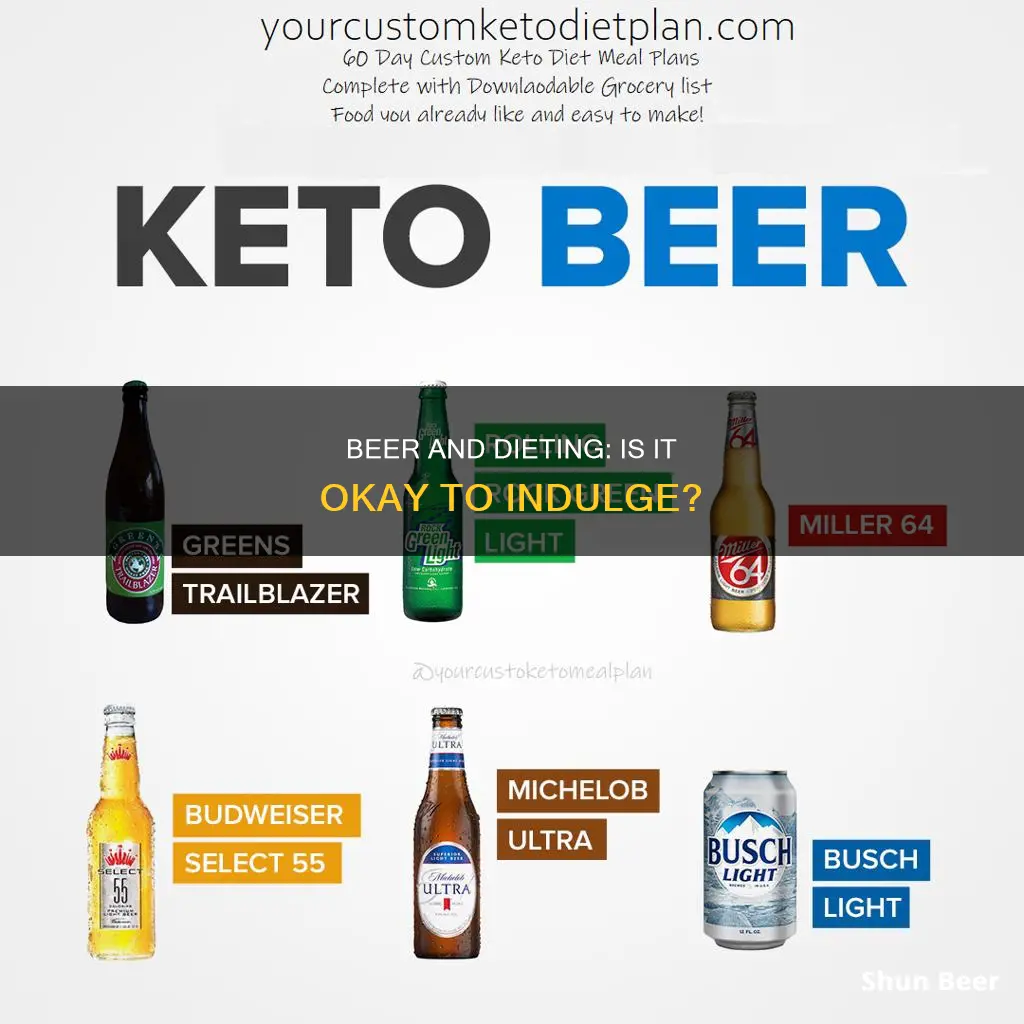
Beer is a popular alcoholic drink, with the US beer industry generating over $100 billion in revenue in 2021. Beer is also the most popular alcoholic beverage in the US, with consumers drinking an average of 68 litres a year. But is it okay to drink beer while on a diet? Beer is known for being high in calories, with a typical beer containing 150 calories, and it is often consumed alongside high-calorie foods like pizza and fried chicken. Alcohol also slows down the fat-burning process, as the liver prioritises breaking down alcohol over burning fat. Therefore, drinking beer can make it more challenging to maintain a calorie deficit and lose weight. However, drinking beer in moderation and opting for light beers with lower alcohol by volume (ABV) can help reduce calorie intake. Additionally, drinking less frequently, such as only on weekends, and choosing lower-carb beers can also help. While it is possible to drink beer while on a diet, it is important to be mindful of the number of beers consumed and to adjust eating habits accordingly.
What You'll Learn

Beer is an empty calorie drink with little nutritional value
Beer is an empty-calorie drink with little nutritional value. Alcoholic beverages, including beer, are considered "empty calories" because they provide almost no nutrients. They primarily consist of water, pure alcohol (ethanol), and variable amounts of sugars and carbohydrates. The content of other nutrients, proteins, vitamins, or minerals is usually insignificant.
The calories in beer are not efficiently metabolised by the body. Alcohol is prioritised by the liver for processing as a toxin, which interrupts other processes like absorbing nutrients and processing fat. This can lead to increased fat storage, particularly around the midsection, resulting in the infamous "beer belly".
Beer and other alcoholic drinks contain almost as many calories per gram as fat. A 12-ounce can of beer contains approximately 154 calories, which is similar to a slice of pizza. However, unlike the pizza, which provides some vitamins and minerals, beer offers little to no nutritional value.
Additionally, drinking beer regularly can increase your likelihood of becoming overweight or obese, which contributes to health risks such as developing type 2 diabetes and increasing your risk of chronic diseases. Therefore, it is important to consume beer in moderation or opt for low-calorie alternatives if you are trying to maintain a healthy weight while still enjoying an occasional beer.
Drinking Beer Post-Durian: Safe or Risky?
You may want to see also

Beer calories are easy to overdo, impacting weight loss
Beer is also often consumed with calorie-dense foods, such as pizza, wings, and other fried foods, which can further increase your calorie intake. Additionally, alcohol can increase your appetite, leading to overeating. The combination of beer calories and the calories from the food you consume while drinking can make it challenging to maintain a calorie deficit, which is necessary for weight loss.
Furthermore, alcohol is metabolized by the body differently from other macronutrients. When you consume alcohol, the liver prioritises breaking it down, which can slow down the fat-burning process. This means that if you're trying to lose weight, drinking beer can hinder your progress.
To minimise the impact of beer on your weight loss journey, it's important to limit your beer intake. You can also opt for light beers with 100 calories or less, drink alcohol only on weekends, or alternate alcoholic drinks with non-alcoholic beverages. Additionally, being mindful of your eating habits while drinking beer and choosing lean protein sources and vegetables can help you manage your calorie intake.
Germans' Historic Preference for Beer Over Water
You may want to see also

Alcohol can negatively affect sleep quality
Secondly, alcohol can worsen symptoms of other sleep disorders such as sleep apnea and insomnia. For people with sleep apnea, alcohol causes the muscles in the throat to relax, creating more resistance when breathing. This can cause the airway to collapse during sleep, leading to heavier snoring and an increased risk of sleep apnea. For those with insomnia, alcohol can become a crutch to induce sleepiness, creating an unhealthy reliance.
Thirdly, alcohol can disrupt circadian rhythms by decreasing the body's sensitivity to cues like daylight and darkness, which are vital for the sleep-wake cycle. This can result in feeling alert when wanting to sleep and sleepy when wanting to be awake.
Finally, alcohol increases urine output, leading to more frequent trips to the bathroom throughout the night, further disrupting sleep.
Beer and Flu Medication: A Safe Mix?
You may want to see also

Beer may cause dehydration
If you don't drink enough water with your beer, you can become dehydrated quickly. This is especially true if you are drinking on an empty stomach, as the alcohol can be absorbed into the bloodstream within minutes.
However, one study found that when drinking moderate amounts of low-alcoholic beverages, the diuretic effect was not as strong as that of other alcoholic beverages like wine and liquor. Therefore, drinking beer in moderation and making sure to drink water throughout the day may help you avoid dehydration.
Beer Drinking: Friend or Foe to Learning?
You may want to see also

Drinking beer can increase appetite
However, despite its high-calorie content, beer does not contribute to a feeling of fullness or satiation. On the contrary, it boosts the appetite. This is because alcohol suppresses the oxidation of fatty acids, which are crucial for appetite regulation. Alcohol also increases thermogenesis, or calorie utilisation, causing heat production, which means you may feel hungry again faster than usual. Additionally, alcohol stimulates or inhibits neurochemical systems that regulate appetite. It affects the hormones Leptin and GLP-1, which suppress appetite. When alcohol enters the body, these hormones are inhibited, and you start feeling hungry even if you are actually full.
Alcohol also stimulates the same neurons in the brain that are triggered when the body goes into starvation mode, which can lead to ethanol-induced overeating. Furthermore, alcohol reduces self-control, making it harder to resist food cravings and overeating.
Research has shown that drinking alcohol increases energy intake, and that alcohol's effect on energy intake is significant. One study found that participants who consumed alcohol before a meal ate more than those who did not. Another study found that participants who drank alcohol reported increased hunger ratings once they had started eating, but not before they had begun. This suggests that alcohol increases hunger only once eating has commenced.
In conclusion, drinking beer can increase appetite due to its effects on hormones, neurons, and self-control. The high calorie content of beer, coupled with increased appetite, can make it challenging for those trying to manage their weight or adhere to a diet.
Beer and Xeralto: Safe Mix or Health Risk?
You may want to see also
Frequently asked questions
Beer is an "empty calorie" drink, providing almost no nutrients and making it easy to consume a lot of calories quickly. Beer can also negatively impact your sleep, which is linked to weight gain and muscle loss. If you are on a diet, it is best to limit your beer consumption or opt for low-calorie options.
Beer can cause weight gain due to its high calorie content, ranging from 100 to 150 calories per 12 ounces. Drinking alcohol can also stop the process of fat burning as the liver prioritises getting rid of alcohol over burning fat.
To drink beer and still lose weight, it is recommended to limit the number of beers per week and be mindful of your eating habits. Opting for light beers with 100 calories or less, drinking only on weekends, and alternating alcoholic drinks with non-alcoholic beverages can help.
A "beer belly" refers to the accumulation of fat in the midsection, often associated with drinking too much beer. However, it is not necessarily caused by beer alone but by consuming too many calories, whether from alcohol, sugary drinks, or oversized portions of food.
According to a 2021 review, drinking beer has been linked to increased bone mineral density and a lower risk of hip fracture. However, more research is needed to evaluate if these potential benefits outweigh the negative effects of beer consumption.







